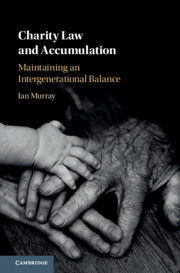Book contents
- Charity Law and Accumulation
- Charity Law and Accumulation
- Copyright page
- Contents
- Acknowledgements
- Table of Cases
- Table of Statutes
- List of Acronyms, Abbreviations and Frequently Cited Works
- Part I Charities and Accumulation Delineated
- Part II Charities and Accumulation Delimited
- Part III Charities and Accumulation Reformed
- 7 Intergenerational Justice and the Intergenerational Distribution of Benefits
- 8 Which Generation Decides the Intergenerational Distribution of Benefits?
- 9 Enhanced Agency Costs
- 10 Conclusion
- Index
10 - Conclusion
from Part III - Charities and Accumulation Reformed
Published online by Cambridge University Press: 23 July 2021
- Charity Law and Accumulation
- Charity Law and Accumulation
- Copyright page
- Contents
- Acknowledgements
- Table of Cases
- Table of Statutes
- List of Acronyms, Abbreviations and Frequently Cited Works
- Part I Charities and Accumulation Delineated
- Part II Charities and Accumulation Delimited
- Part III Charities and Accumulation Reformed
- 7 Intergenerational Justice and the Intergenerational Distribution of Benefits
- 8 Which Generation Decides the Intergenerational Distribution of Benefits?
- 9 Enhanced Agency Costs
- 10 Conclusion
- Index
Summary
The book concludes that accumulation rules do not clearly incorporate a normative basis for determining an intergenerational allocation of benefits and so should be reformed to require regard to principles of intergenerational justice. Further, while the present generation is able, in some circumstances, to disregard spending restrictions and ongoing accumulation requirements, it is asserted that current charity controllers should have greater ability to disregard accumulation restrictions or requirements so as to adopt different principles of intergenerational justice, or to pursue the same principles of intergenerational justice, but in a more efficient way. Finally, the book argues that there is a range of legal restraints that seek to reduce the agency costs from accumulation and that the critical issue is the ability of regulators to work cooperatively to fill in gaps.
Keywords
- Type
- Chapter
- Information
- Charity Law and AccumulationMaintaining an Intergenerational Balance, pp. 272 - 282Publisher: Cambridge University PressPrint publication year: 2021

